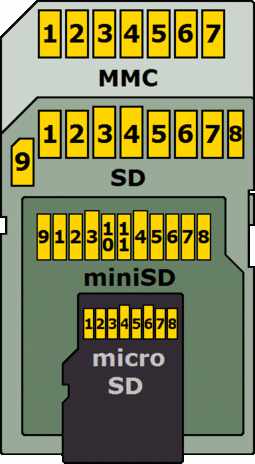SD Storage
Provides Storage Management support for SD cards.
This code is ported from the SD Card library.
Currently uses only SPI communication, which offers only a limited interface and is not supported by SDUC cards.
SD Card connections

MMC pin |
SD pin |
miniSD pin |
microSD pin |
Name |
I/O |
Logic |
Description |
|---|---|---|---|---|---|---|---|
1 |
1 |
1 |
2 |
nCS |
I |
PP |
SPI Card Select [CS] (Negative logic) |
2 |
2 |
2 |
3 |
DI |
I |
PP |
SPI Serial Data In [MOSI] |
3 |
3 |
3 |
VSS |
S |
S |
Ground |
|
4 |
4 |
4 |
4 |
VDD |
S |
S |
Power |
5 |
5 |
5 |
5 |
CLK |
I |
PP |
SPI Serial Clock [SCLK] |
6 |
6 |
6 |
6 |
VSS |
S |
S |
Ground |
7 |
7 |
7 |
7 |
DO |
O |
PP |
SPI Serial Data Out [MISO] |
8 |
8 |
8 |
NC nIRQ |
O |
OD |
Unused (memory cards) Interrupt (SDIO cards) (negative logic) |
|
9 |
9 |
1 |
NC |
Unused |
|||
10 |
NC |
Reserved |
|||||
11 |
NC |
Reserved |
Usage
Code should be built with
ENABLE_STORAGE_SIZE64=1 unless using a very small card (1 or 2GB):Add required libraries to your project’s component.mk file:
COMPONENT_DEPENDS := SdStorage FatIFS
Create and initialise a Card Device instance:
#include <Storage/SD/Card.h> // GPIO used for Chip Select (Esp8266) #define PIN_CARD_CS 5 // Create the SD card Device and register with the Storage library auto card = new Storage::SD::Card("card1", SPI); Storage::registerDevice(card); if(!card->begin(PIN_CARD_CS)) { // Handle error here return; } // Display some information Serial << "CSD" << endl << card->csd << endl; Serial << "CID" << endl << card->cid;
At this point, the card can be accessed directly using Storage::Device methods.
If the card has been formatted then the partitions can be accessed using the standard Storage API.
For example:
Storage::Partition part;
// Find the first FAT partition on the card
part = *card->partitions().find(Storage::Partition::SubType::Data::fat);
// Get the first partition (of any type)
part = *card->partitions().begin();
// Iterate through all partitions
for(part: card->partitions()) {
Serial << part << endl;
}
To create a partition table on the card:
#include <Storage/Disk/GPT.h> Storage::Disk::GPT::PartitionTable table; // Create one partition using 100% of all available space table.add("My FAT partition", 0, 100); auto err = Storage::Disk::formatDisk(*card, table); Serial << "formatDisk: " << err << endl; if(!!err) { // If formatting fails, the disk will left in an indeterminate state! ... return; } // Fetch the first (and only) partition auto part = card->partitions().begin();
Note
To use the entire card as a single partition, it is not necessary to pre-format the disk. Instead, construct a partition spanning the entire disk:
auto part = card->editablePartitions().add("My Partition",
Storage::Partition::SubType::Data::fat, 0, card->getSize());
This approach is sometimes referred to as an SFD (Single Filing-system Device).
The partition can now be formatted with the required filing system (FAT):
int res = IFS::FAT::formatVolume(part);
Serial << "formatVolume : " << IFS::Error::toString(res) << endl;
Once formatted, the partition can be mounted as usual:
auto fatfs = IFS::createFatFilesystem(part);
if(fatfs != nullptr) {
if(fatfs->mount() == FS_OK) {
// OK, access the filing system
Serial << fatfs->getContent("My file.txt") << endl;
} else {
// Mount failed, destroy the objects
delete fs;
delete card; // Also de-registers the card with the Storage API
}
}
API Documentation
-
namespace SD
-
class Card : public Storage::Disk::BlockDevice
- #include <Card.h>
Public Functions
-
bool begin(uint8_t chipSelect, uint32_t freq = 0)
Initialise the card.
- Parameters:
chipSelect –
freq – SPI frequency in Hz, use 0 for maximum supported frequency
-
inline virtual String getName() const override
Obtain unique device name.
-
inline virtual uint32_t getId() const
Obtain device ID.
- Return values:
uint32_t – typically flash chip ID
-
inline virtual Type getType() const
Obtain device type.
-
inline virtual size_t getBlockSize() const override
Obtain smallest allocation unit for erase operations.
-
bool begin(uint8_t chipSelect, uint32_t freq = 0)
-
struct CID
- #include <CID.h>
Public Members
-
uint8_t mid
Manufacturer ID.
-
char oid[2]
OEM / Application ID.
-
char pnm[5]
Product name.
-
uint8_t prv
Product revision.
-
uint32_t psn
Product serial number.
-
uint16_t mdt
Manufacturing date.
-
uint8_t not_used
Always 1.
-
uint8_t crc
7-bit checksum
-
uint8_t mid
-
struct CSD
- #include <CSD.h>
Subclassed by Storage::SD::CSD1, Storage::SD::CSD2, Storage::SD::CSD3
-
class Card : public Storage::Disk::BlockDevice
References
SoC support
esp32
esp32c2
esp32c3
esp32s2
esp32s3
esp8266
host
rp2040